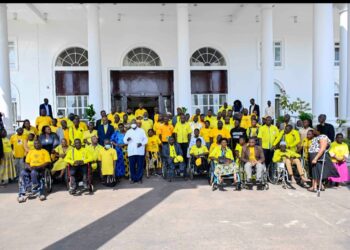The Ministry of Energy and Mineral Development, in collaboration with the Fuel Marking and Quality Monitoring (FMQP), has launched a Fuel Consumer Awareness Campaign in various Eastern Uganda districts to educate the public on fuel quality and quantity standards.
Commencing on October 23 and running until October 27, the campaign seeks to uphold the fuel retail standards established by Uganda Standards. The initiative covers multiple activities in districts such as Mbale, Kapchorwa, Sironko, Pallisa, Bugiri, Bulambuli, Kumi, Butaleja, Namutumba, Manafwa, Tororo, Bugweri, and Bukedea.
These activities involve engaging local authorities and the public, shedding light on FMQP’s role in verifying fuel quality and quantity at retail stations.
During a key campaign event workshop held on Thursday at the Wash and Wills Hotel in Mbale City, representatives from the Ministry of Energy and Mineral Development (MEMD) and the Uganda National Bureau of Standards (UNBS) apprised local district leaders about FMQP’s operations, particularly in field quality and quantity verification at fuel retail stations.
Rev. Justaf Frank Tukwasibwe, Commissioner of the Petroleum Supply Department, led the sensitization team from MEMD, underscored the importance of aligning activities with Uganda’s Constitution and emphasized the pivotal role of local governments in delivering services to the public.
The campaign also addressed the regulatory framework for fuel station establishment, with a focus on the 2015 requirement for a minimum one-kilometre distance between stations. However, some districts have permitted the construction of unregulated and potentially unsafe stations without proper permits.
Rev. Tukwasibwe acknowledged the significant contributions of Oil Marketing Companies to local economies, including job creation. Nonetheless, he also highlighted the challenge posed by unlicensed fuel sales, particularly in areas lacking formal fuel stations. “Addressing this issue poses a dilemma for authorities, as cracking down on illegal operations could adversely affect communities dependent on them. Together, we need to discuss and agree on the best way forward,” he stated.
Stakeholders raised concerns about the ambiguous role of local governments and called for an amendment to the Petroleum Supply Act of 2003. There was also a specific query regarding the licensing of fuel stations without canopies, advocating for enhanced collaboration and information sharing during regulatory inspections.
The campaign further addressed the disposal of adulterated fuel, stressing the need for a robust system to prevent its re-entry into the market.
The sensitization event was attended by Mr Nangalama Daniel Richard Makayi, the Acting Executive Director of UNBS; Stephen Barisigala, the head of Standards, Licensing, and Quality Assurance at MEMD; and representatives from SICPA, the company responsible for fuel marking in Uganda.
In sum, the campaign demonstrates a commitment to promote compliance among fuel retailers and equip local communities with the knowledge to demand and verify the quality and quantity of fuel they purchase, bringing the region closer to achieving the national goal of ensuring fuel quality assurance.
Do you have a story in your community or an opinion to share with us: Email us at editorial@watchdoguganda.com













